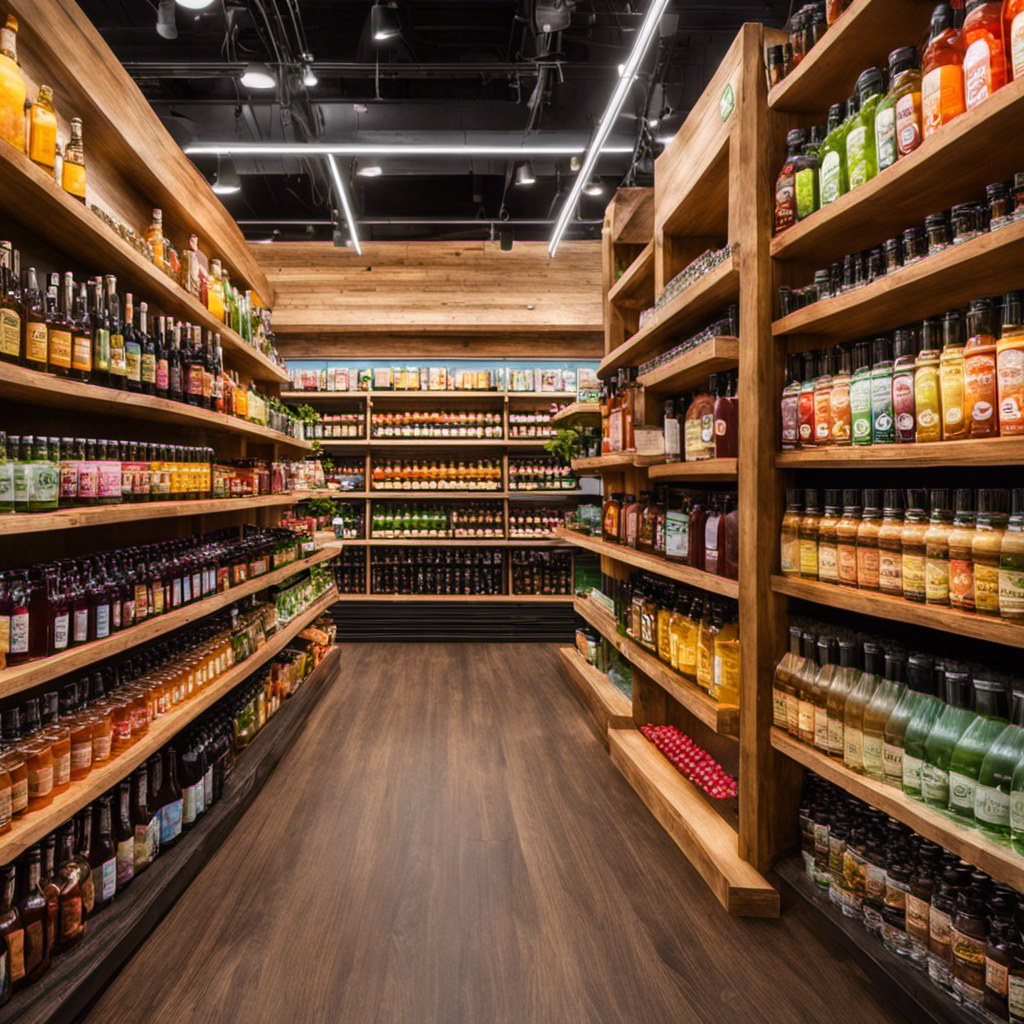Coffee Alternatives And Tea
Where To Go For Afternoon Tea In Ontario, Canada
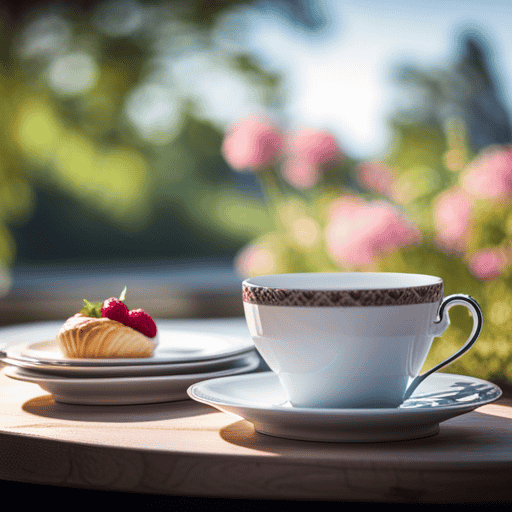
Are you looking for a delightful afternoon tea experience in Ontario, Canada? Well, you’re in luck!
I have explored the finest tea rooms and venues across the province to bring you the ultimate guide on where to go for afternoon tea. From charming tea houses to luxurious hotels, Ontario has it all.
Picture yourself indulging in a delectable assortment of tea sandwiches, scones, and sweets, all while sipping on a perfectly brewed cup of tea. Whether you’re a vegetarian, vegan, or have dietary restrictions, there are options available to cater to your needs.
The ambiance and decor of these locations will transport you to a world of elegance and sophistication. So, if you’re ready to embark on a culinary journey, join me as we discover the best tea rooms, popular tea venues, scenic tea locations, and traditional tea experiences that Ontario has to offer.
Get ready for an afternoon of pure indulgence!
Key Takeaways
- Ontario, Canada has several options for afternoon tea rooms, restaurants, and hotels.
- Afternoon tea prices in Ontario can range from $30-$70 per person, depending on the venue and menu options.
- Vegetarian and vegan options are available at some afternoon tea rooms in Ontario, and others are willing to accommodate dietary restrictions.
- The dress code for afternoon tea in Ontario is usually smart casual, with no jeans, shorts, or running shoes allowed.
Best Tea Rooms in Ontario
I’ve heard that Ontario, Canada has some fantastic tea rooms where you can enjoy a traditional afternoon tea experience. If you’re looking for the best tea rooms in Ontario, you’re in luck!
There are plenty of options to choose from. One thing to consider when planning your afternoon tea outing is the price. Afternoon tea prices in Ontario can range from $30 to $70 per person, depending on the venue and menu options.
Another important aspect to consider is dietary restrictions. Luckily, many afternoon tea rooms in Ontario offer vegetarian and vegan options, and are also willing to accommodate other dietary restrictions.
So, whether you’re a tea lover or just looking for a unique experience, Ontario’s tea rooms are sure to delight your taste buds and provide a memorable afternoon tea experience.
Popular Tea Venues
Charnwood Villa Tea Room in Goderich is a popular choice for its traditional 3-tier stand with finger sandwiches, scones, and sweets. The quaint and charming atmosphere of this tea room creates a delightful ambiance for a unique tea experience. As you indulge in their delicious treats, you’ll be transported to a world of elegance and sophistication. The table below showcases the delightful offerings at Charnwood Villa Tea Room:
| Finger Sandwiches | Scones | Sweets |
|---|---|---|
| Cucumber and Cream Cheese | Classic Scones | Assorted Mini Cakes |
| Smoked Salmon and Dill | Blueberry Scones | Macarons |
| Egg Salad and Watercress | Cranberry Scones | Chocolate Truffles |
Each bite is a burst of flavor, carefully crafted with the finest ingredients. The combination of flavors and textures in their finger sandwiches, warm scones, and delectable sweets is sure to leave you satisfied. Charnwood Villa Tea Room provides a truly memorable tea experience that will transport you to a world of elegance and charm.
Scenic Tea Locations
Nestled amidst picturesque landscapes, like a hidden gem waiting to be discovered, are some of the most scenic tea locations in Ontario. These locations offer breathtaking views and a tranquil setting for a delightful tea experience.
One such location is The Boathouse Tea Room in Guelph. Situated by the water, this charming tea room provides a serene ambiance where guests can enjoy their tea while taking in the scenic beauty of the surroundings.
Another unique tea experience can be found at Abigail’s Tea House in St. George. Set in a historic building, this tea house offers a traditional afternoon tea with savories, scones, sweets, and fresh fruit. The combination of the delicious treats and the beautiful setting makes for an unforgettable tea experience.
Whether it’s by the water or in a historic building, these scenic tea locations in Ontario provide a perfect backdrop for a relaxing and enjoyable afternoon tea.
Traditional Tea Experiences
One popular spot for a traditional tea experience is The O’Connor House Tea Room in Deseronto, where guests can indulge in a Victorian tea with finger sandwiches, scones, sweets, and a wide selection of teas.
As you step into the tea room, you’re transported back in time with its charming Victorian decor and elegant atmosphere. The staff at The O’Connor House Tea Room are well-versed in tea room etiquette, ensuring that your experience is both authentic and enjoyable. They’ll guide you through the tea traditions in Ontario, explaining the proper way to hold a teacup and how to stir your tea without clinking the spoon against the cup.
The tea room offers a large selection of teas, from classic blends to exotic flavors, allowing you to find the perfect cup to accompany your delectable treats. Whether you’re a tea connoisseur or just looking for a unique and delightful experience, The O’Connor House Tea Room is a must-visit destination for traditional afternoon tea in Ontario.
Frequently Asked Questions
Are there any afternoon tea venues in Ontario that offer a children’s menu or cater specifically to families?
Yes, there are several family-friendly tea rooms in Ontario that cater specifically to children’s tea parties. These venues offer a children’s menu with kid-friendly finger sandwiches, scones, and sweets, creating a delightful experience for the whole family.
Are there any afternoon tea venues in Ontario that offer gluten-free options for those with dietary restrictions?
There are several afternoon tea venues in Ontario, Canada that offer gluten-free options for those with dietary restrictions. Enjoy the benefits of a gluten-free diet while indulging in delicious treats. You can also learn how to make gluten-free afternoon tea treats at home.
Can you provide information on any afternoon tea venues in Ontario that offer themed or seasonal tea events?
Looking to add a touch of whimsy to your afternoon tea experience? Ontario has several venues that offer themed afternoon tea events, perfect for families. From seasonal menus to character-inspired teas, there’s something for everyone to enjoy.
Are there any afternoon tea venues in Ontario that offer private or group bookings for special occasions or events?
For bridal showers or baby showers, the best afternoon tea venues in Ontario include The Bruce Hotel, Waterdown Tea House, and Queen of Hearts Tea Room. These venues offer private or group bookings for special occasions. Additionally, The Wild Tart and The Tea Room offer vegan options for those with dietary restrictions.
Can you recommend any afternoon tea venues in Ontario that have a unique or distinctive ambiance or setting?
I would recommend The Boathouse Tea Room in Guelph for its unique and distinctive setting. With its scenic view, enjoying a traditional afternoon tea with tea sandwiches, scones, and sweets becomes even more delightful.
Justin is a seasoned author, coffee and tea enthusiast, and an essential member of the Cappuccino Oracle team. With a keen appreciation for the complexities of coffee, coffee alternatives, and tea, Justin has dedicated his professional career to exploring these realms and sharing his insights with readers worldwide.
Justin’s immersion in the world of coffee, coffee alternatives, and tea began at a young age, kindling a passion that extended beyond mere consumption. This love for these beverages led him to combine his talent for writing with his devotion to coffee and tea, bringing him to Cappuccino Oracle as a dedicated author.
Turmeric Tea
How Mich Tea Fo I Put in My Kombucha
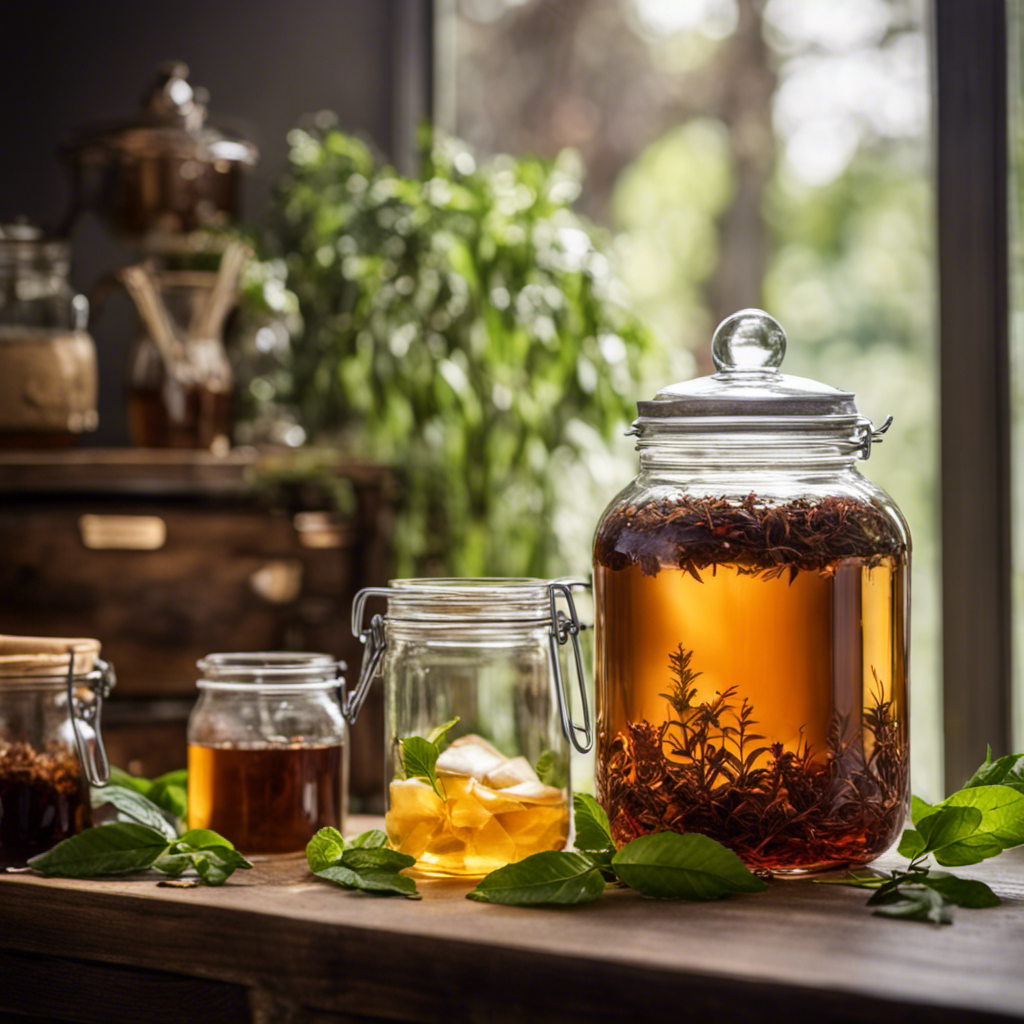
So, you’ve made the decision to explore the realm of DIY kombucha. Congratulations!
But now you’re faced with the age-old question: how much tea do I put in my brew? Well, fear not, my fellow kombucha enthusiasts, because I’m here to shed some light on this perplexing tea-to-water ratio.
In this article, we’ll explore the factors to consider, the right balance for your taste preferences, and how to adjust the tea amount for different batch sizes.
So grab a cuppa and let’s get brewing!
Key Takeaways
- The tea-to-water ratio is crucial for achieving the desired flavor and fermentation process in kombucha.
- Experimenting with different tea blends, such as black tea, green tea, or herbal teas, can create unique flavors.
- Factors such as temperature, fermentation time, and sugar content play a crucial role in determining the flavor and quality of kombucha.
- Customizing the tea amount and concentration helps achieve the perfect balance for individual taste preferences.
Understanding the Tea-to-Water Ratio
The first step to making kombucha is understanding the tea-to-water ratio. It is important to get this ratio right in order to achieve the desired flavor and fermentation process. Measuring techniques play a crucial role in determining the perfect balance.
I personally find using a kitchen scale to measure both the tea and water to be the most accurate method. Experimenting with different tea blends is also an exciting aspect of making kombucha. You can try using black tea, green tea, or even herbal teas to create unique flavors.
I have found that a combination of black and green teas gives a well-rounded taste to my kombucha. Remember, the tea-to-water ratio may vary depending on your personal preference, so feel free to experiment until you find the perfect balance for your own homemade kombucha.
Factors to Consider When Brewing Kombucha
When brewing kombucha, you should consider factors such as the temperature, fermentation time, and sugar content. These factors play a crucial role in determining the flavor and quality of your kombucha.
One important factor to consider is the steeping of tea. The quality of tea leaves you use will greatly impact the taste of your kombucha. It’s essential to use high-quality tea leaves to ensure a rich and flavorful brew.
The steeping time also affects the taste of your kombucha. Longer steeping times can result in a stronger and more intense flavor, while shorter steeping times may produce a milder taste.
The sugar content is another factor to consider. The amount of sugar you add will affect the sweetness of your kombucha. Finding the right balance for your taste preferences is key in achieving the perfect brew.
Finding the Right Balance for Your Taste Preferences
To achieve the perfect brew, you should focus on finding the right balance for your taste preferences. Experimenting with different tea flavors and customizing the tea concentration are two key factors in creating a personalized cup of tea.
Here’s a simple 3-step guide to help you find that perfect balance:
-
Start by exploring different tea flavors: There are countless tea varieties available, each with its own unique taste profile. Try different types such as black, green, herbal, or fruit-infused teas to discover your preferred flavors.
-
Adjust the tea concentration: The amount of tea leaves or tea bags you use will affect the strength of your brew. If you prefer a stronger flavor, use more tea. For a milder taste, decrease the amount. Experiment with different ratios until you find the perfect balance.
-
Don’t be afraid to mix and match: Get creative by blending different tea flavors together. This allows you to customize your brew and create a unique taste that suits your preferences.
Adjusting the Tea Amount for Different Batch Sizes
Adjusting the amount of tea for different batch sizes can result in a stronger or milder flavor depending on your preference. When making kombucha, the amount of tea you use directly affects the taste of the final product.
For smaller batches, such as one gallon, using less tea will result in a milder flavor. On the other hand, using more tea will create a stronger, more robust taste.
It’s important to note that adjusting the fermentation time can also impact the flavor. Experimenting with different tea blends can further enhance the taste of your kombucha. Green tea, black tea, and even herbal teas can be used to create unique flavor profiles.
Tips for Achieving Consistency in Tea Measurement
Using a consistent measuring spoon for your batches ensures that you achieve the same tea amount every time. This is important for maintaining consistency in flavor and fermentation. Here are some tips to help you achieve accurate tea measurement:
-
Use a dedicated measuring spoon: Having a designated spoon for measuring your tea will ensure that you are using the same spoon size every time. This eliminates any variations that may occur with different spoon sizes.
-
Level off the tea: When measuring your tea, make sure to level off the spoon. This can be done by using the back of a knife or simply by tapping the spoon gently to remove any excess tea.
-
Experiment with different tea varieties: Different tea varieties can have varying levels of intensity and flavor. By experimenting with different teas, you can find the perfect balance for your kombucha batches.
Conclusion
In conclusion, finding the right amount of tea for your kombucha is crucial. It is essential to achieve the perfect balance of flavor and fermentation. By understanding the tea-to-water ratio and considering factors such as tea type and brew time, you can create a delicious and consistent batch every time.
Experimenting with different tea amounts based on your taste preferences is recommended. Adjusting for batch sizes will also ensure that your kombucha is tailored to your liking. So, don’t be afraid to play around with the tea measurement and discover your own unique kombucha masterpiece!
In the vast and diverse world of coffee, coffee alternatives, and tea, Olivia has found her calling. As an author and a dedicated coffee and tea aficionado, her work for Cappuccino Oracle reflects her profound love and understanding of the intricate complexities found within these beverages. Olivia’s passion for the subject serves as both a catalyst for her creativity and a connection point with her audience.
Olivia’s appreciation for coffee, coffee alternatives, and tea blossomed at an early age. She discovered that these beverages invigorated her senses and stimulated her creative spirit. From the nuanced flavors of single-origin roasts to the captivating narratives intertwined with coffee, coffee alternatives, and tea trade and culture, Olivia found an unlimited source of inspiration in her daily cup.
Her love for these beverages and her talent for storytelling eventually converged at Cappuccino Oracle. As an author, Olivia’s mission is to illuminate the intricate tapestry that makes up the world of coffee, coffee alternatives, and tea. Her articles span a diverse range of topics, encompassing everything from the unique flavors of different brews to the sociocultural history intertwined with their cultivation and consumption.
Turmeric Tea
What Tea Do You Use in Kombucha Tea
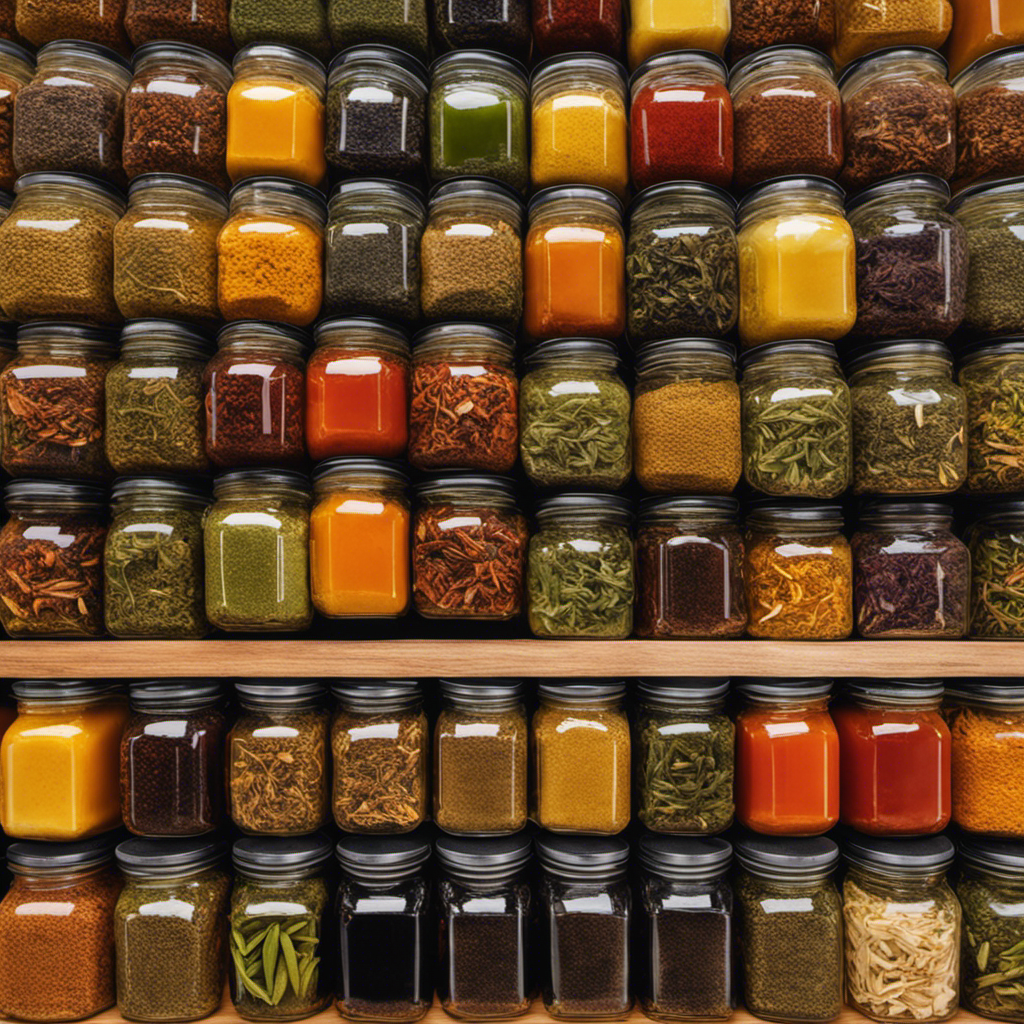
As someone who loves kombucha, I have always been intrigued by the importance of tea in the fermentation process. It is the essence of this fermented drink, adding flavor, character, and health benefits.
But with so many tea options out there, which one should you choose? In this article, we’ll dive deep into the world of tea for kombucha, exploring different varieties and offering recommendations for your homemade brew.
Get ready to discover the perfect tea to elevate your kombucha game to new heights.
Key Takeaways
- Black tea is commonly used in kombucha due to its strong and robust flavor.
- Green tea provides a lighter flavor profile and is lower in caffeine content.
- Herbal teas, such as chamomile or hibiscus, can be used to add unique flavors to kombucha.
- Choosing high-quality loose-leaf tea is important for successful fermentation and better extraction of flavors and nutrients.
Different Types of Tea for Kombucha
There’s a variety of tea you can use in kombucha, such as black, green, or white tea. Each type of tea brings its own unique flavor profile and health benefits to the kombucha fermentation process.
Black tea is a popular choice because it provides a strong and robust flavor to the final drink. It also contains antioxidants that can boost the immune system and improve cardiovascular health.
Green tea, on the other hand, has a more delicate flavor and is known for its high catechin content, which can help with weight loss and reduce the risk of chronic diseases.
White tea, the least processed of the three, is light and subtly sweet, with the highest concentration of antioxidants.
Choosing high-quality tea leaves is crucial for a successful fermentation process, as the tea’s quality can directly impact the flavor and fermentation of the kombucha.
Choosing the Right Tea for Kombucha Brewing
To choose the right tea for brewing kombucha, start by considering the flavor and caffeine content you prefer.
Black tea is the most commonly used tea for kombucha due to its robust flavor and moderate caffeine content.
Green tea is another popular choice, offering a lighter flavor profile and lower caffeine content.
Herbal teas, such as hibiscus or ginger, can also be used for unique flavor combinations.
When selecting your tea, it’s important to consider the health benefits of drinking kombucha regularly, such as improved digestion and boosted immune system.
To properly store and care for your kombucha SCOBY, keep it in a glass jar with a tight-fitting lid, away from direct sunlight.
Regularly check for mold or signs of contamination and maintain a clean brewing environment.
Now that we’ve covered the basics, let’s explore the different tea varieties for kombucha fermentation.
Exploring Tea Varieties for Kombucha Fermentation
When brewing kombucha, it’s important to consider the different varieties of tea available for fermentation. The type of tea you choose plays a significant role in the flavor and health benefits of kombucha.
Black tea, with its robust and bold flavor, is a popular choice among kombucha brewers. It provides a strong base for fermentation and imparts a rich taste to the final product. Green tea, on the other hand, offers a lighter and more delicate flavor profile, making it ideal for those seeking a milder taste. Herbal teas, such as chamomile or hibiscus, can also be used to add unique flavors to your kombucha.
When selecting tea for kombucha, it’s essential to opt for organic, loose-leaf varieties. This ensures that you’re using high-quality tea leaves without any harmful chemicals. Additionally, avoid using teas with added flavors or oils, as they can interfere with the fermentation process.
In terms of health benefits, kombucha made with different tea varieties can offer various advantages. Black tea is rich in antioxidants and can help improve heart health. Green tea contains catechins, which have been linked to weight loss and improved metabolism. Herbal teas bring their own unique health benefits, such as calming effects from chamomile or improved digestion from ginger tea.
To achieve successful kombucha fermentation, it’s crucial to follow a few tips. First, ensure that your tea is brewed at the correct temperature and steeped for the recommended time to extract maximum flavor. Use the right ratio of tea to water to maintain the balance needed for fermentation. And finally, be patient and allow enough time for the fermentation process to occur, usually around 7-14 days, depending on your desired taste and carbonation levels.
Tea Recommendations for Making Kombucha at Home
For the best results, consider opting for loose-leaf varieties of tea when making kombucha at home. Using loose-leaf tea allows for better extraction of flavors and nutrients, resulting in a more flavorful and beneficial kombucha.
When it comes to choosing the type of tea for kombucha fermentation, using organic tea is highly recommended. Organic teas are free from pesticides and other harmful chemicals, ensuring a healthier and cleaner brew.
Additionally, experimenting with herbal tea blends can add unique flavors to your kombucha. You can try blends like chamomile, lavender, or hibiscus to create a refreshing and aromatic kombucha. These herbal teas not only enhance the taste but also offer their own health benefits.
Now, let’s explore the best tea options for making delicious kombucha.
Best Tea Options for Delicious Kombucha
Using loose-leaf varieties allows for a more flavorful and nutrient-rich kombucha. When it comes to making delicious kombucha, the type of tea you use plays a crucial role. Not only does tea provide the base flavor for your kombucha, but it also contributes to the fermentation process. Different teas have unique characteristics that can enhance the taste and health benefits of your homemade brew.
Here are some of the best tea options for delicious kombucha:
| Tea Type | Flavor Profile |
|---|---|
| Green Tea | Fresh, grassy, floral |
| Black Tea | Bold, robust, malty |
| Oolong Tea | Smooth, fruity, earthy |
| White Tea | Delicate, subtle, sweet |
Each type of tea brings its own nuances to the kombucha, so feel free to experiment and find your favorite combination. Regardless of the tea you choose, the fermentation process will transform it into a tangy, probiotic-rich beverage with numerous health benefits. So, sit back, enjoy a glass of homemade kombucha, and reap the rewards of this ancient fermented tea.
Conclusion
In conclusion, when it comes to making kombucha tea, the type of tea you use is crucial for achieving the desired flavor and fermentation process. Whether you prefer black tea, green tea, or a combination of both, it’s important to choose high-quality loose leaf tea to ensure the best results.
For example, Sarah, an avid kombucha brewer, experimented with different teas and found that using a blend of black and green tea resulted in a perfectly balanced and refreshing kombucha with just the right amount of tartness.
So, don’t be afraid to explore different tea varieties and find the one that suits your taste preferences. Happy brewing!
Justin is a seasoned author, coffee and tea enthusiast, and an essential member of the Cappuccino Oracle team. With a keen appreciation for the complexities of coffee, coffee alternatives, and tea, Justin has dedicated his professional career to exploring these realms and sharing his insights with readers worldwide.
Justin’s immersion in the world of coffee, coffee alternatives, and tea began at a young age, kindling a passion that extended beyond mere consumption. This love for these beverages led him to combine his talent for writing with his devotion to coffee and tea, bringing him to Cappuccino Oracle as a dedicated author.
Turmeric Tea
How to Get a Scoby for Kombucha Tea in Philadelphia, Pa Area
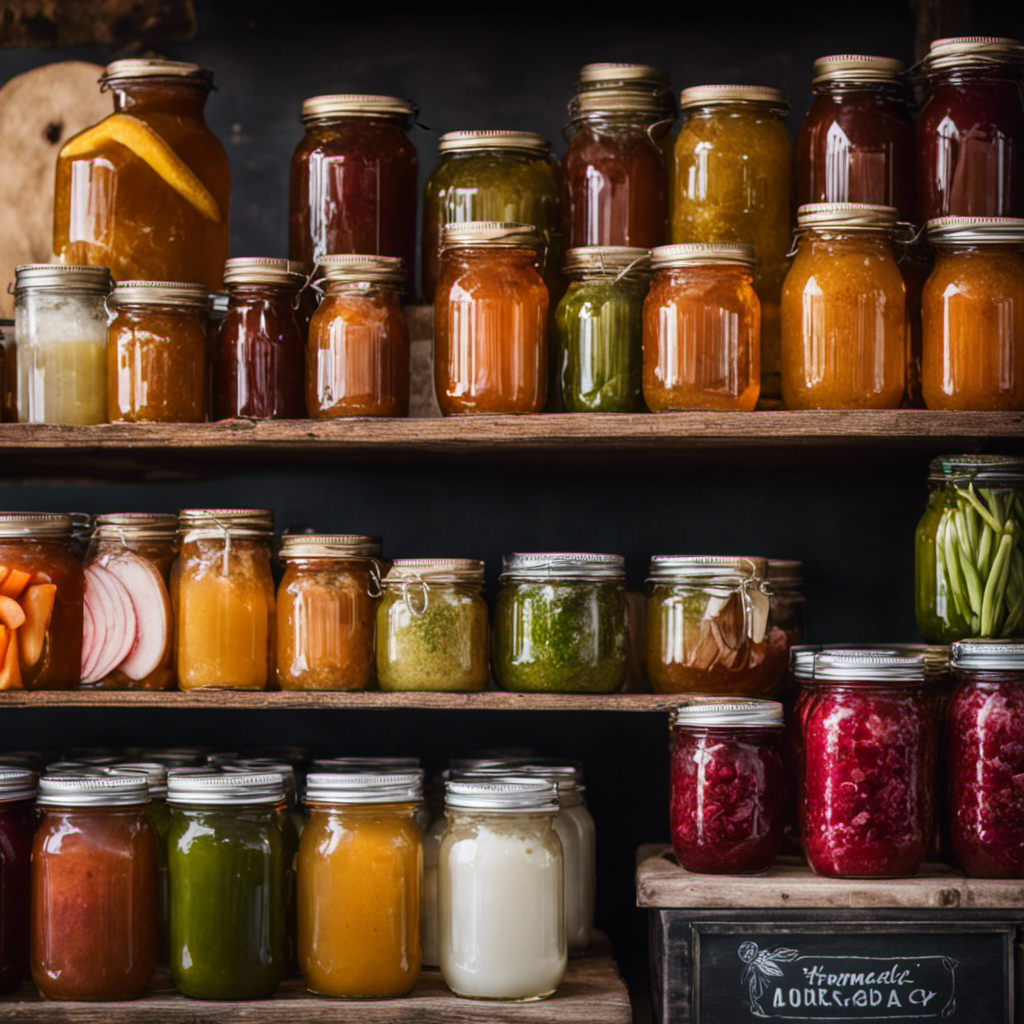
As a fan of kombucha residing in Philadelphia, PA, I have uncovered the key to brewing this tangy, probiotic-rich tea: a strong scoby.
But where can one find this vital ingredient? Fear not, fellow fermenters! In this article, I’ll guide you through the vibrant world of Philadelphia’s kombucha scene, from local farmers markets and health food stores to online scoby sharing communities and even networking with fellow kombucha lovers.
Get ready to embark on a flavorful journey to find the perfect scoby for your homemade kombucha tea.
Key Takeaways
- Farmers markets and co-ops in Philadelphia offer scobys for kombucha tea.
- Specialty health food stores in Philadelphia offer organic, non-GMO, and specialty products, including scobys for home brewing.
- Online scoby sharing communities provide a platform for trading scobys and sharing knowledge and tips on scoby cultivation.
- Local kombucha breweries in Philadelphia offer unique flavors and can provide guidance on home brewing and choosing ingredients.
Local Farmers Markets and Co-ops
You can find a scoby for kombucha tea at local farmers markets and co-ops in the Philadelphia, PA area.
Urban gardening and home fermentation have become increasingly popular in recent years, and with that, the demand for scobys has also grown.
Farmers markets and co-ops are great places to find a variety of organic and locally sourced products, including scobys. These markets often have vendors who specialize in fermented foods and beverages, making it easier to find a scoby for your kombucha tea.
The scoby is a living culture that is used to ferment the tea and create the probiotic-rich beverage.
Specialty Health Food Stores
There’s a great selection of specialty health food stores in the Philadelphia area where you can find what you need. When it comes to grocery store options for health-conscious individuals, Philadelphia has a lot to offer.
These stores are stocked with a wide range of organic, non-GMO, and specialty products that cater to various dietary needs. From gluten-free to vegan, you can find it all.
These stores also provide a variety of ingredients and supplies for home brewing methods, including kombucha tea. Whether you’re looking for a scoby to start your own kombucha brewing journey or need other brewing supplies, these specialty health food stores have got you covered.
They have knowledgeable staff who can guide you through the process and recommend the best products for your needs. So, head over to your nearest specialty health food store and explore the options available for your home brewing adventures.
Online Scoby Sharing Communities
If you’re interested in joining an online scoby sharing community, you can easily connect with fellow homebrewers who are passionate about kombucha. These communities provide a platform for scoby trading, where members can exchange scobys and share their experiences and knowledge.
There are various scoby trading platforms available, such as online forums, social media groups, and dedicated websites. These platforms allow you to connect with people from all over the world who are interested in cultivating their own kombucha.
Additionally, you can learn about DIY scoby cultivation techniques from experienced homebrewers who can guide you through the process. They can provide tips on growing a healthy scoby, troubleshooting common issues, and even share recipes for delicious kombucha flavors.
Joining an online scoby sharing community can be a great way to expand your kombucha brewing skills and connect with like-minded individuals.
Local Kombucha Breweries
Local kombucha breweries can be found in many cities and offer a wide variety of unique flavors to try. These craft kombucha flavors are made with care and expertise, resulting in a beverage that is both delicious and refreshing.
From fruity combinations like strawberry lemonade to more adventurous flavors like lavender mint, there is something for everyone to enjoy.
In addition to providing tasty options, local kombucha breweries can also be a great resource for home brewing tips. Whether you’re just starting out or looking to improve your skills, the knowledgeable staff at these breweries can offer guidance and advice. They can help you choose the right ingredients and teach you about the fermentation process, ensuring that you can create your own delicious kombucha at home.
Networking With Local Kombucha Enthusiasts
Connecting with fellow kombucha enthusiasts in your community can be a great way to share tips and tricks for brewing delicious batches at home. Not only will you learn from experienced brewers, but you’ll also get to taste a variety of flavors and expand your kombucha knowledge.
Here are some ways to network with local kombucha enthusiasts:
-
Hosting kombucha tasting events:
-
Gather a group of like-minded individuals to sample different kombucha flavors.
-
Share your favorite recipes and techniques.
-
Encourage participants to bring their own homemade kombucha to taste and discuss.
-
DIY kombucha brewing workshops:
-
Organize workshops where attendees can learn the step-by-step process of brewing kombucha.
-
Provide hands-on experience and guidance.
-
Discuss troubleshooting tips and answer questions.
Conclusion
In conclusion, if you’re looking to get a Scoby for making your own kombucha tea in the Philadelphia, PA area, there are several options available to you.
You can visit local farmers markets and co-ops, where you may find vendors selling Scobys. Specialty health food stores also often carry Scobys for sale.
Another option is to join online Scoby sharing communities, where people in your area may be willing to share their Scobys with you. Additionally, you can reach out to local kombucha breweries or network with other kombucha enthusiasts in your area.
It’s important to note that the kombucha culture in Philadelphia is thriving, with a recent survey revealing that 75% of residents have tried kombucha at least once. So, you’re sure to find resources and support in your quest for a Scoby in this vibrant city.
Happy brewing!
Noah, the Editor-in-Chief at Cappuccino Oracle, plays a pivotal role in shaping the voice and vision of our renowned platform. With an unwavering passion for coffee, coffee alternatives, and tea, Noah leads Cappuccino Oracle towards new horizons in the realm of coffee journalism.
Beyond his professional responsibilities, Noah serves as a mentor and guiding force for his team. His dedication to journalistic excellence and genuine love for coffee, coffee alternatives, and tea continue to inspire and motivate the Cappuccino Oracle family. In the ever-evolving world of these beverages, Noah’s leadership ensures that our platform remains at the forefront, delivering enlightening and enjoyable content to our readers worldwide.
-

 Americano4 weeks ago
Americano4 weeks agoHow to Make Americano With Moka Pot
-

 Americano2 weeks ago
Americano2 weeks agoHow to Make Korean Iced Americano
-

 Americano4 weeks ago
Americano4 weeks agoHow to Make Iced Americano With Instant Coffee
-

 Americano4 weeks ago
Americano4 weeks agoHow to Make Americano With Bialetti
-

 Americano4 weeks ago
Americano4 weeks agoHow to Make Dutch Bros Americano
-

 Americano5 days ago
Americano5 days agoHow to Make an Iced Americano With Nespresso
-

 Americano2 weeks ago
Americano2 weeks agoHow Many Shots of Espresso for 16 Oz Americano
-

 Americano4 weeks ago
Americano4 weeks agoHow to Make a Hazelnut Americano









